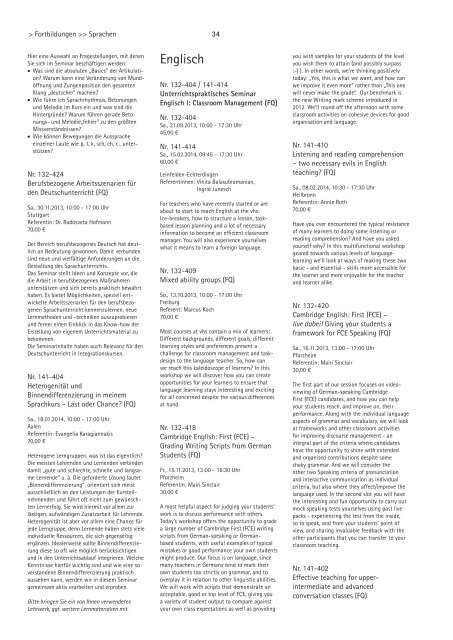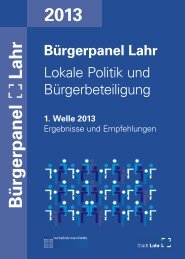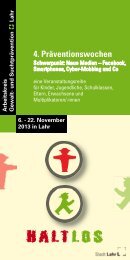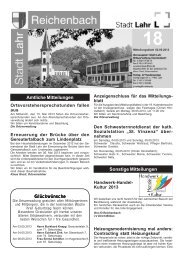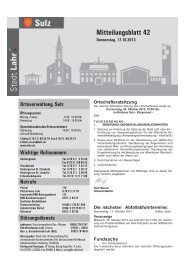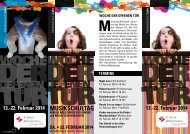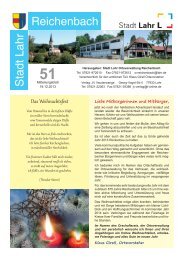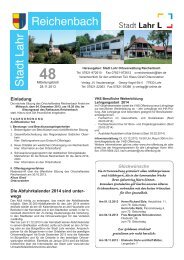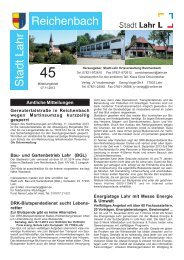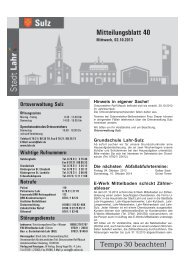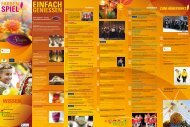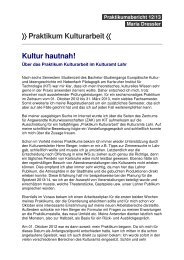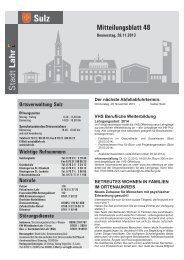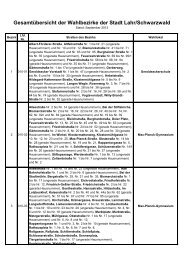Fortbildungen VHS-Verband BW 2/2013 (application/pdf) - Stadt Lahr
Fortbildungen VHS-Verband BW 2/2013 (application/pdf) - Stadt Lahr
Fortbildungen VHS-Verband BW 2/2013 (application/pdf) - Stadt Lahr
Erfolgreiche ePaper selbst erstellen
Machen Sie aus Ihren PDF Publikationen ein blätterbares Flipbook mit unserer einzigartigen Google optimierten e-Paper Software.
<strong>Fortbildungen</strong> >> Sprachen 34<br />
Hier eine Auswahl an Fragestellungen, mit denen<br />
Sie sich im Seminar beschäftigen werden:<br />
• Was sind die absoluten „Basics" der Artikulation?<br />
Warum kann eine Veränderung von Mundöffnung<br />
und Zungenposition den gesamten<br />
Klang „deutscher" machen?<br />
• Wie führe ich Sprachrhythmus, Betonungen<br />
und Melodie im Kurs ein und was sind die<br />
Hintergründe? Warum führen gerade Betonungs-<br />
und Melodie„fehler" zu den größten<br />
Missverständnissen?<br />
• Wie können Bewegungen die Aussprache<br />
einzelner Laute wie p, t, k, sch, ch, r... unterstützen?<br />
Nr. 132-424<br />
Berufsbezogene Arbeitsszenarien für<br />
den Deutschunterricht (FQ)<br />
Sa., 30.11.<strong>2013</strong>, 10:00 - 17:00 Uhr<br />
Stuttgart<br />
Referentin: Dr. Radosveta Hofmann<br />
70,00 €<br />
Der Bereich berufsbezogenes Deutsch hat deutlich<br />
an Bedeutung gewonnen. Damit verbunden<br />
sind neue und vielfältige Anforderungen an die<br />
Gestaltung des Sprachunterrichts.<br />
Das Seminar stellt Ideen und Konzepte vor, die<br />
die Arbeit in berufsbezogenen Maßnahmen<br />
unterstützen und sich bereits praktisch bewährt<br />
haben. Es bietet Möglichkeiten, speziell entwickelte<br />
Arbeitsszenarien für den berufsbezogenen<br />
Sprachunterricht kennenzulernen, neue<br />
Lernmethoden und -techniken auszuprobieren<br />
und ferner einen Einblick in das Know-how der<br />
Erstellung von eigenem Unterrichtsmaterial zu<br />
bekommen.<br />
Die Seminarinhalte haben auch Relevanz für den<br />
Deutschunterricht in Integrationskursen.<br />
Nr. 141-404<br />
Heterogenität und<br />
Binnendifferenzierung in meinem<br />
Sprachkurs – Last oder Chance? (FQ)<br />
Sa., 18.01.2014, 10:00 - 17:00 Uhr<br />
Aalen<br />
Referentin: Evangelia Karagiannakis<br />
70,00 €<br />
Heterogene Lerngruppen, was ist das eigentlich?<br />
Die meisten Lehrenden und Lernenden verbinden<br />
damit „gute und schlechte, schnelle und langsame<br />
Lernende“ u. ä. Die geforderte Lösung lautet<br />
„Binnendifferenzierung“, orientiert sich meist<br />
ausschließlich an den Leistungen der Kursteilnehmenden<br />
und führt oft nicht zum gewünschten<br />
Lernerfolg. Sie wird hiermit vor allem zur<br />
lästigen, aufwändigen Zusatzarbeit für Lehrende.<br />
Heterogenität ist aber vor allem eine Chance für<br />
jede Lerngruppe, denn Lernende haben stets viele<br />
individuelle Ressourcen, die sich gegenseitig<br />
ergänzen. Idealerweise sollte Binnendifferenzierung<br />
diese so oft wie möglich berücksichtigen<br />
und in den Unterrichtsablauf integrieren. Welche<br />
Kenntnisse hierfür wichtig sind und wie eine so<br />
verstandene Binnendifferenzierung praktisch<br />
aussehen kann, werden wir in diesem Seminar<br />
gemeinsam aktiv erarbeiten und erproben.<br />
Bitte bringen Sie ein von Ihnen verwendetes<br />
Lehrwerk, ggf. weitere Lernmaterialien mit.<br />
Englisch<br />
Nr. 132-404 / 141-414<br />
Unterrichtspraktisches Seminar<br />
Englisch I: Classroom Management (FQ)<br />
Nr. 132-404<br />
Sa., 21.09.<strong>2013</strong>, 10:00 - 17:30 Uhr<br />
45,00 €<br />
Nr. 141-414<br />
Sa., 15.02.2014, 09:45 - 17:30 Uhr<br />
60,00 €<br />
Leinfelden-Echterdingen<br />
Referentinnen: Vinita Balasubramanian,<br />
Ingrid Junesch<br />
For teachers who have recently started or are<br />
about to start to teach English at the vhs:<br />
Ice-breakers, how to structure a lesson, taskbased<br />
lesson planning and a lot of necessary<br />
information to become an efficient classroom<br />
manager. You will also experience yourselves<br />
what it means to learn a foreign language.<br />
Nr. 132-409<br />
Mixed ability groups (FQ)<br />
So., 13.10.<strong>2013</strong>, 10:00 - 17:00 Uhr<br />
Freiburg<br />
Referent: Marcus Koch<br />
70,00 €<br />
Most courses at vhs contain a mix of learners:<br />
Different backgrounds, different goals, different<br />
learning styles and preferences present a<br />
challenge for classroom management and taskdesign<br />
to the language teacher. So, how can<br />
we reach this kaleidoscope of learners? In this<br />
workshop we will discover how you can create<br />
opportunities for your learners to ensure that<br />
language learning stays interesting and exciting<br />
for all concerned despite the various differences<br />
at hand.<br />
Nr. 132-418<br />
Cambridge English: First (FCE) –<br />
Grading Writing Scripts from German<br />
Students (FQ)<br />
Fr., 15.11.<strong>2013</strong>, 13:00 - 16:30 Uhr<br />
Pforzheim<br />
Referentin: Mairi Sinclair<br />
30,00 €<br />
A most helpful aspect for judging your students’<br />
work is to discuss performance with others.<br />
Today’s workshop offers the opportunity to grade<br />
a large number of Cambridge First (FCE) writing<br />
scripts from German-speaking or Germanbased<br />
students, with useful examples of typical<br />
mistakes or good performance your own students<br />
might produce. Our focus is on language, since<br />
many teachers in Germany tend to mark their<br />
own students too strictly on grammar, and to<br />
overplay it in relation to other linguistic abilities.<br />
We will work with scripts that demonstrate an<br />
acceptable, good or top level of FCE, giving you<br />
a variety of student output to compare against<br />
your own class expectations as well as providing<br />
you with samples for your students of the level<br />
you wish them to attain (and possibly surpass<br />
:-) ). In other words, we’re thinking positively<br />
today: „Yes, this is what we want, and how can<br />
we improve it even more“ rather than „This one<br />
will never make the grade“. Our benchmark is<br />
the new Writing mark scheme introduced in<br />
2012. We’ll round off the afternoon with some<br />
classroom activities on cohesive devices for good<br />
organisation and language.<br />
Nr. 141-410<br />
Listening and reading comprehension<br />
– two necessary evils in English<br />
teaching? (FQ)<br />
Sa., 08.02.2014, 10:30 - 17:30 Uhr<br />
Heilbronn<br />
Referentin: Annie Roth<br />
70,00 €<br />
Have you ever encountered the typical resistance<br />
of many learners to doing some listening or<br />
reading comprehension? And have you asked<br />
yourself why? In this multifunctional workshop<br />
geared towards various levels of languagelearning<br />
we’ll look at ways of making these two<br />
basic - and essential - skills more accessible for<br />
the learner and more enjoyable for the teacher<br />
and learner alike.<br />
Nr. 132-420<br />
Cambridge English: First (FCE) –<br />
live dabei! Giving your students a<br />
framework for FCE Speaking (FQ)<br />
Sa., 16.11.<strong>2013</strong>, 13:00 - 17:00 Uhr<br />
Pforzheim<br />
Referentin: Mairi Sinclair<br />
30,00 €<br />
The first part of our session focuses on videoviewing<br />
of German-speaking Cambridge<br />
First (FCE) candidates, and how you can help<br />
your students reach, and improve on, their<br />
performance. Along with the individual language<br />
aspects of grammar and vocabulary, we will look<br />
at frameworks and other classroom activities<br />
for improving discourse management - an<br />
integral part of the criteria where candidates<br />
have the opportunity to shine with extended<br />
and organised contributions despite some<br />
shaky grammar. And we will consider the<br />
other two Speaking criteria of pronunciation<br />
and interactive communication as individual<br />
criteria, but also where they affect/improve the<br />
language used. In the second slot you will have<br />
the interesting and fun opportunity to carry out<br />
mock speaking tests yourselves using past live<br />
packs - experiencing the test from the inside,<br />
so to speak, and from your students’ point of<br />
view, and sharing invaluable feedback with the<br />
other participants that you can transfer to your<br />
classroom teaching.<br />
Nr. 141-402<br />
Effective teaching for upperintermediate<br />
and advanced<br />
conversation classes (FQ)


